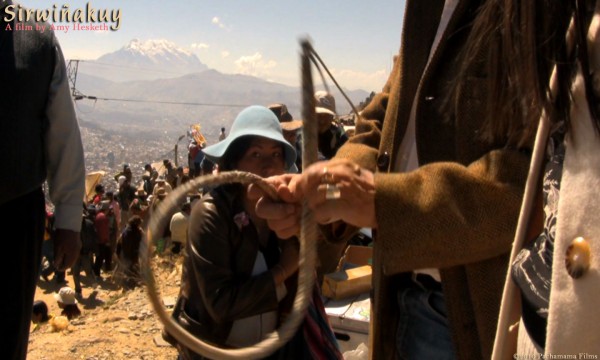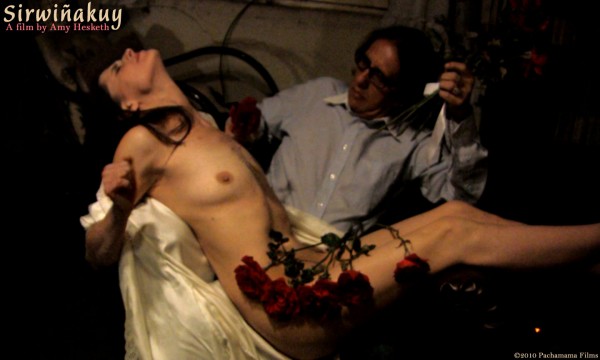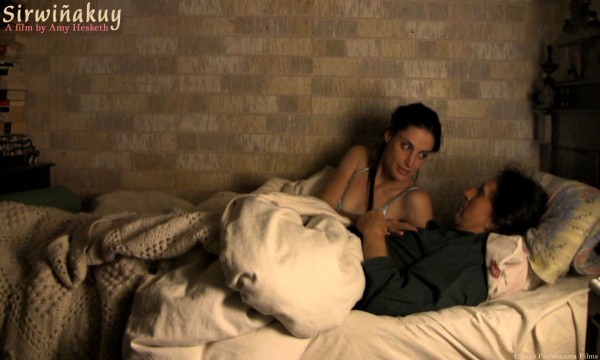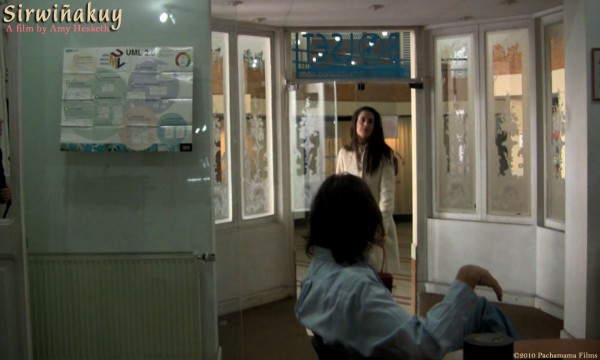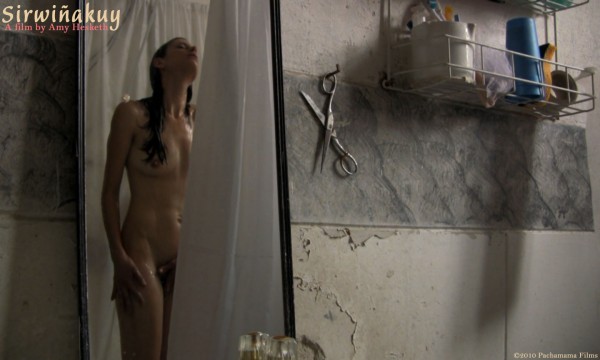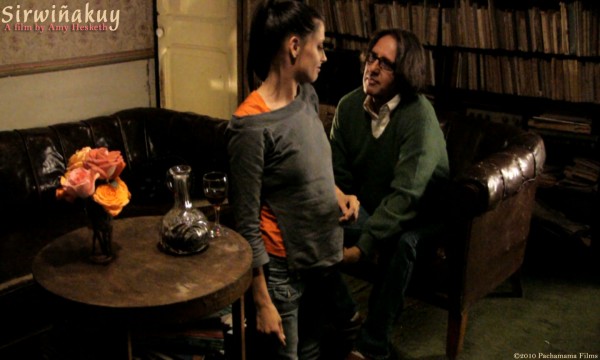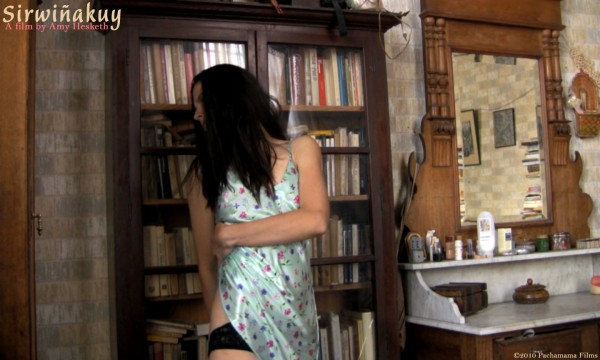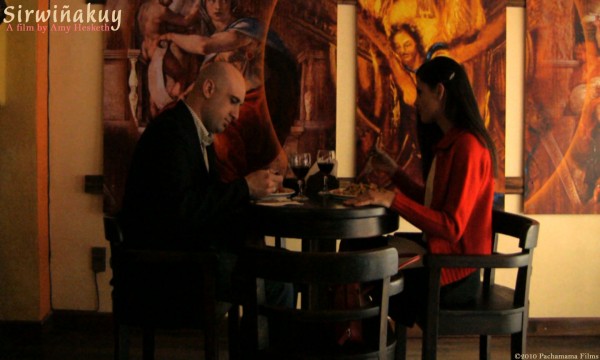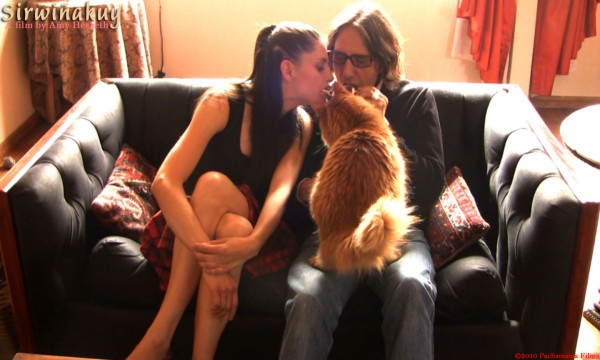The following review of Sirwiñakuy was published on January 19th, 2014 in the Beverly Hills Outlook
FROM THE VAULT
Sirwiñakuy
REVIEWED BY CHARLES LONBERGER
What is most significant about this remarkable film from 2010 is how completely director Amy Hesketh absorbs and makes cinematic conventions her own, breaking them at will, such as her insertion of sped up footage though back streets to bridge scenes, as opposed to standard editing practices.
Though her approach is an exercise in masterful storytelling, she boldly turns to documentary techniques when her fiction leads to an open Andean market, where whips are sold as common merchandise.
Despite her employment of cinematic narrative traditions, her approach is also symbolic, with the Andes, whose culture she drew upon for her basic premise, hovering over the landscape in the background, and in red high heels that represent Woman’s sexual nature.
The script, also by Hesketh, contemporizes “popular wisdom,” in the form of sirwiñakuy, an Andean courtship practice whereby a man kidnaps his woman of choice. If they are compatible, he marries her. If they are not, she is sent home to await the next suitor.
Out of this central conceit, Hesketh creates a parable about a particular woman’s growth, allegorized by the use of crowds to parallel narrative developments (a disruptive protest march to signify lead character Anouk’s state of mind at the beginning, and a celebratory crowd to – subliminally – cheer the central couple’s reunion at the story’s conclusion). Hesketh’s portrayal of an S&M love affair rings true: sexual congress is assumed by the Dominant, or captor, but is not pushed, though when it does come, the sex is forced. So does her somewhat symbolic depiction of spats followed by make up roses, whose thorns puncture the flesh of their recipient.
The script is most successful when portraying the harmony of a man who needs to totally control another, buying her clothes, employing her, providing for food and rent, and his chosen, who, as a “child that refuses to grow up,” needs to be completely controlled, and is in constant need of correction. Hesketh’s fiction works best when depicting their mutual fulfillment and affection.
But, of course, life is not just…well, a bed of roses, and Hesketh’s script becomes forced, when depicting a (brief) separation. Further, it doesn’t bode well that the first thing the chosen one, Anouk, does when returning to her Everything, Luis Montez, at his company and her workplace, is slap him in the face…before surrendering to his embrace.
Hesketh’s direction is well-showcased by the exceptional production design of Jac Avila, a creation of urbanized, earth toned color coordination, vast panoramas, and which refers to Europe, specifically European sado-masochism through popular culture, in its inclusion of Puccini posters “Turandot” The cinematography of producer Jac Avila himself, is very romantic in its gorgeous night time vistas. He lingers lovingly and long on actress Veronica Paintoux’s outie as she masturbates in the shower.
Avila’s involvement is so pronounced as to make him a virtual co-creator. He also assumed the duties of editor, suggesting, via that function, that both patriarchy and matriarchy approve of male-on-female corporal punishment.
A word must be said about the superlative soundtrack, a moody blend of Baroque, Beethoven and Bossa Nova. It creates an ambiance, while the sound design is constructed out of the sound of torrential rain showers and background music at cafes.
In front of the camera, Avila also assumes the role of Montez. His father figure function is euphamized as a house that is beautiful, but old. His performance is quirky and self-contained, and he creates a three-dimensional portrait of a wise human being that “wants to beat my ass all the time!”
As Anouk, Veronica Paintoux’s performance of a multi-dimensional character is fully realized. Looking at her welts in the mirror, her behind bruised from being beaten, she conveys the reactively resentful child within the woman without becoming condescending or mannered. Her interpretation is completely credible, and believable in its emotional conflicts.
Representing the uncomprehending world of Vanilla, Erik Antoine, as an old flame of Anouk, is shaken by signs of her physical abuse.
Two signatures of the production company, Bolivia’s Pachamama Films, took root in this release: again, the dialogue, in French, English and Spanish, was unselfconsciously interchangeable. And a denouement is added that plays like an inside joke, with director Hesketh getting her face repeatedly slapped in BTS rehearsal footage, the better to show her actors what she is…er, looking for, and how it is done.
Pachamama Films are distributed by Vermeerworks.


